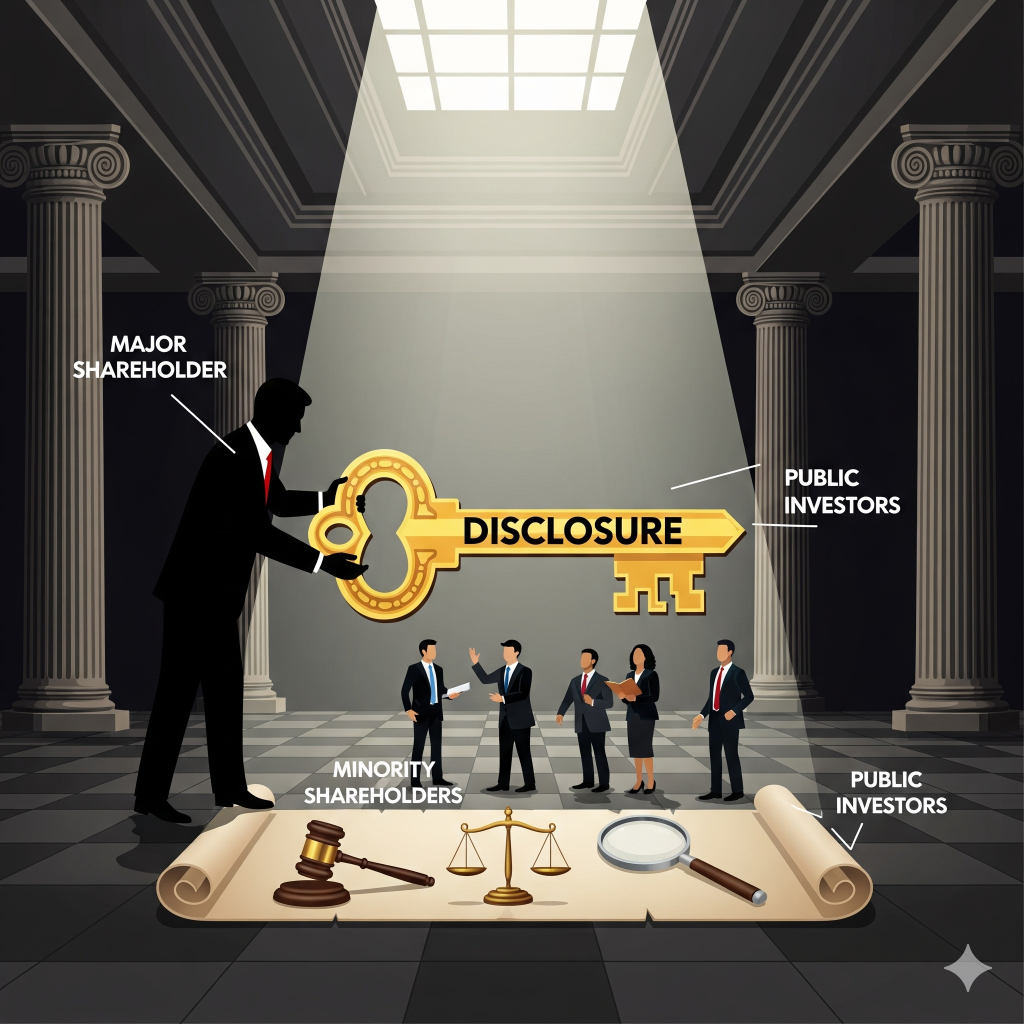
Disclosure responsibilities are a critical obligation for major shareholders, ensuring transparency, fairness, and compliance in the securities market. These responsibilities are designed to protect the interests of investors and maintain the integrity of the market. This document provides a comprehensive explanation of the definition of a “major shareholder,” the ownership thresholds that trigger reporting and disclosure requirements, and the procedures for fulfilling these obligations as stipulated by Vietnamese securities laws and regulations.By adhering to these rules, major shareholders not only fulfill their legal duties but also contribute to fostering trust and stability within the financial market.
- Who is Considered a “Major Shareholder”?
According to Clause 18, Article 4 of the 2019 Securities Law, an organization or individual is classified as a major shareholder if they own at least 5% of the voting shares of an issuing organization.
Major shareholders are included in the group of entities subject to reporting and disclosure obligations if the shares they own are voting shares issued by a public company or a public securities investment company.
- Ownership Thresholds Requiring Reporting and Disclosure
Major shareholders must comply with reporting and disclosure requirements when their ownership reaches, exceeds, or fluctuates across the following thresholds:
- The 5% Threshold – Becoming or Ceasing to Be a Major Shareholder
- Definition of Major Shareholder Status: Ownership of 5% of voting shares determines the status of a major shareholder.
- Reporting Obligation: The obligation to report and disclose arises when an organization or individual becomes a major shareholder (ownership increases from below 5% to 5% or above) or ceases to be a major shareholder (ownership decreases from 5% or above to below 5%) of a public company or a public securities investment company.
- Effective Date: The date of becoming or ceasing to be a major shareholder is determined as the completion date of securities transactions as regulated.
- The 1% Threshold – Changes Affecting the Control Mechanism
- Definition and Obligation: Under Clause 2, Article 31 of Circular No. 96/2020/TT-BTC, a major shareholder of a public company or public securities investment company must report and disclose information when their ownership changes by 1% or more of the total voting shares.
- Effective Date: The date of crossing the 1% threshold is also determined as the completion date of securities transactions as regulated.
- To Whom and How Should the Reporting Be Made?
In the above cases, major shareholders must report fully and accurately to the following entities:
- Public Company or Fund Management Company:
- Applicable Situations: When owning shares of a public company or a public securities investment company.
- Reporting Methodology: Reporting and disclosure must follow the specific regulations of the respective public company or fund management company.
- State Securities Commission (SSC):
- Submission Methods: Reports can be submitted via electronic accounts. If electronic submission is unavailable, both a hard copy (by mail or direct submission) and a soft copy (via fax or email to the designated address) must be submitted simultaneously.
- Stock Exchange Where the Shares Are Listed or Registered for Trading:
- Submission Methods: For shareholders with an electronic account at the stock exchange, reports should be submitted through the respective account. If no account exists, submission must include both a hard copy (by mail or direct submission) and a soft copy (via fax or email).
- Note: Reporting methods may be subject to change as per the regulations of relevant authorities or organizations over time.
- Reporting Deadline: Reports must be submitted within 5 working days from the date of becoming or ceasing to be a major shareholder or from the date of a change in ownership crossing the defined thresholds.
- Exemptions from Reporting and Disclosure Obligations
The obligation to report and disclose information does not apply to shareholders who are not actively conducting transactions in the following cases:
- Changes in Shareholding Due to Corporate Actions: The change in the percentage of voting shares results from the public company buying back its own shares or issuing additional shares.
- Other Situations: Exemptions provided under specific legal provisions.
In conclusion, the disclosure responsibilities of major shareholders play an essential role in enhancing transparency and accountability within the securities market. By understanding and adhering to the requirements outlined above, major shareholders not only comply with legal obligations but also contribute to the fair and efficient operation of the market. Timely and accurate disclosure of information helps strengthen the confidence of investors and stakeholders, ensuring that all participants in the market can make informed decisions. Failure to comply with these obligations may result in legal consequences and damage to the reputation of the shareholder. Therefore, it is imperative that all major shareholders remain diligent in fulfilling their reporting and disclosure duties to promote a transparent and trustworthy financial environment.
📞 CONTACT LEGAL CONSULTANT:
TLA Law is a leading law firm with a team of highly experienced lawyers specializing in criminal, civil, corporate, marriage and family law, and more. We are committed to providing comprehensive legal support and answering all your legal questions. If you have any further questions, please do not hesitate to contact us.
1. Lawyer Vu Thi Phuong Thanh, Manager of TLA Law LLC, Ha Noi Bar Association
Email: vtpthanh@tlalaw.vn
2. Lawyer Tran My Le, Chairman of the Members’ Council, Ha Noi Bar Association
Email: tmle@tlalaw.vn.
Dinh Phuong Thao

